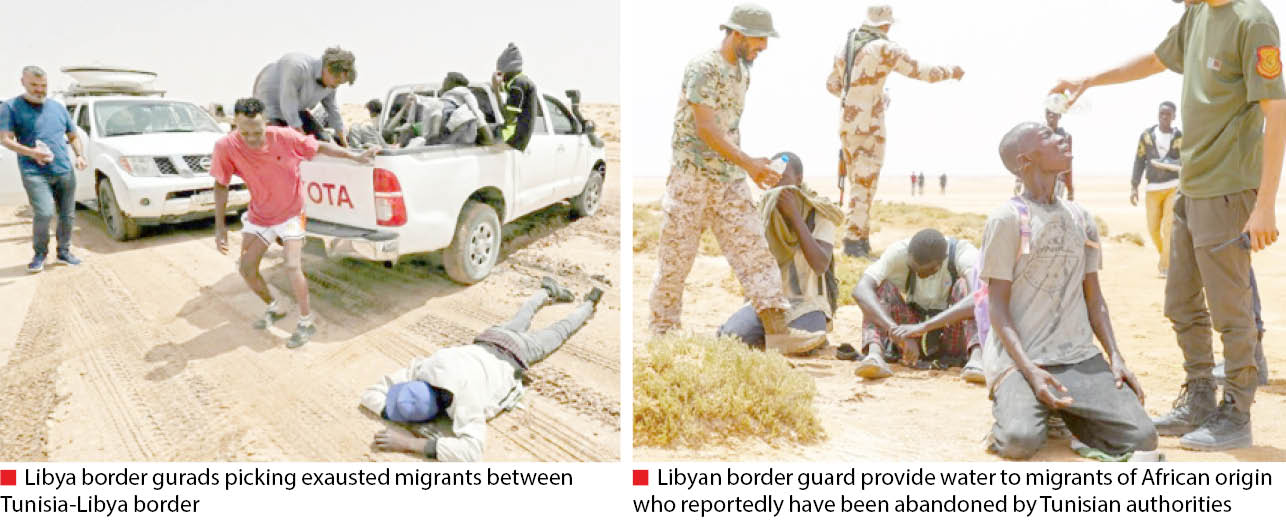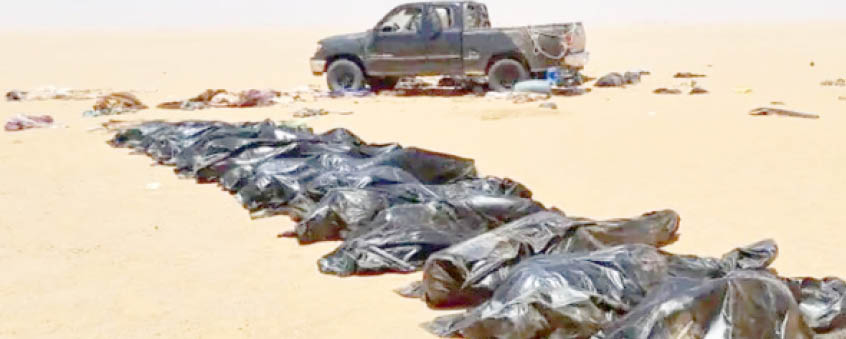Nigerians, black migrants between life and death in the desert
Abandoned and almost forgotten, Nigerians and hundreds of other black African migrants thirst for water after days of walking under 40 degrees Celsius of hot weather in the desert between Tunisia and Libya. Hundreds of migrants arrive daily in Libya after being abandoned in the desert borderland by Tunisian security forces according to Libyan border […]

Abandoned and almost forgotten, Nigerians and hundreds of other black African migrants thirst for water after days of walking under 40 degrees Celsius of hot weather in the desert between Tunisia and Libya.
Hundreds of migrants arrive daily in Libya after being abandoned in the desert borderland by Tunisian security forces according to Libyan border guards.
Around 100 men and women were rescued from an uninhabited zone near Sebkhat Al-Magta, a Salt Lake along the Libya-Tunisia border in one day, AFP reports.
In twos and threes or by the dozens, they come. Some collapse. The guards hold bottles of water over their parched mouths.
- 63-year-old woman’s corpse disappears from Ondo morgue
- Subsidy: Schools to reduce activities to cut costs – NAPPS
According to AFP, over the past two weeks, the Libyan border guards have rescued hundreds of migrants who said they were left by Tunisian authorities in the border region near Al-Assah, about 150 kilometers (90 miles) west of Tripoli.
Human Rights Watch put the number of black migrants expelled or forcibly moved out of Tunisia to the country’s desert border with Libya and Algeria at 1,200 in July.
Some like Alexander Uche Okole said they had walked for two days, without food or water.
Okole, 41, from Nigeria, said he entered Tunisia via Debdeb in Algeria, and “spent some time in Tunis but then the Tunisian police got me. They arrested me in the street and then took me down to the Sahara Desert.”
“With the Grace of God, the Libyans rescued me” and provided food and water, Okole said.
He survived but others have not. Humanitarian groups say 17 of the migrants have died over the past three weeks.

How it all started?
Violence erupted in Sfax – a port city in Tunisia, after a member of Parliament from Sfax by the name Tarek Mahdi posted a video on Facebook, showing a man lying unconscious on the ground, drenched in blood.
The attackers are “Africans”, said Mahdi, who blamed them for “being everywhere” and called for a reaction from the people of Sfax.
The video soon went viral spurring up emotions, shortly after which a hunt for black Africans began on the streets and in their homes.
But Mahdi may have gotten his inspiration from the Tunisian President Kais Said who in a seemingly racist statement in February said that “urgent measures” must be implemented to stop sub-Saharan African immigrants from changing the north-African nation’s demographic make-up.
The alleged racial comment according to Amnesty International emboldened recent attacks on black sub-Saharan migrants either settling in Tunisia, seeking asylum, refugees, or irregular migrants.
Data by Integral human development indicates that between 2004 and 2014, the number of non-Tunisian nationals residing in Tunisia rose by 66 per cent, from 35,192 to 53,490 individuals.
In a single year (2016-17), the number of individuals apprehended off the Tunisian coast trying to reach Europe almost quadrupled, from 71 to 271.
Economic Pressure
Some Tunisians believe that the influx of migrants is putting pressure on the labour market, increasing the unemployment rate in the country.
This is evident in the rising resentment and discrimination against sub-Saharan Africans since the economic downturn that trailed the end of the Arab spring in 2011.
According to the World Bank (2022a, b), Tunisia’s economy stagnated between 2011 and 2019, with average gross domestic product (GDP) growth of only 1.7per cent.
The COVID-19 pandemic and the Russia- Ukraine war have compounded the country’s economic woes. Despite some recovery in GDP since a sharp -8.8 per cent contraction in 2020, the country has not fully bounced back, with GDP growing by 4.3 per cent in 2021 and 2.4 per cent in 2022.
The country has also experienced surging double-digit inflation, reaching 10.2 per cent in 2023, with food prices increasing by 14.6 per cent.
Unemployment rates remain high in 2023 (15.2 per cent), particularly among youth (38.8 per cent) and the highly educated (24 per cent) (Institut National de la Statistique, 2023a, b, c).
Poverty rates have also increased, with one-sixth of the country now classified as impoverished, and recurring food shortages have become a widespread issue (Institut National de la Statistique, 2021; Le Monde, 2022).
Analysts say the resentment for Sub-Saharan Africans stems from believe that the migrants are taking jobs from Tunisians, even when Tunisians themselves are not willing to do some of the menial jobs that the migrants do.
The Skin Colour
Tunisia is a country in the Maghreb region of North Africa, bordered by Algeria to the west and southwest, Libya to the southeast, and the Mediterranean Sea to the north and east.
As of 2019, Tunisia had a total population of 11.7 million people, 98 per cent of whom are Arabs, (1 per cent) European, (1 per cent) Jewish and others (1 per cent).
The seeming racial lineage of countries in the North African region namely Egypt, Algeria, Libya, Morocco and Tunisia have often been viewed as the reason behind how the region relates with the rest of Africa as many of them consider themselves first as Arabs.
In his now perceived racists statement, Tunisian President appears to be worried about this demographic makeup of his country when he mentioned the alleged conspiracy to change the country’s demography and turn it into “just another African country that doesn’t belong to the Arab and Islamic nations anymore.”
Many accounts by the black migrants suggest that they’re being targeted because of the colour of their skin. Amnesty International says “a campaign of anti-Black hatred has swept social and mainstream media in Tunisia.
Amnesty says it interviewed 20 people in Tunis – among them five asylum-seekers and 15 undocumented migrants from Cameroon, Sierra Leone, Ghana, Nigeria, Guinea and Ivory Coast. They were all attacked by mobs, and in at least three cases, the police were present but failed to intervene.
“In eight cases, migrant workers and asylum-seekers said they’d been forced out of their homes by mobs and their belongings were either stolen or destroyed. Ten people told Amnesty they’d been expelled by their landlords after the authorities threatened to punish anyone hosting or employing “illegal migrants” Amnesty reveals.
International Migration Crisis
UNHCR estimates indicate the presence of 5,406 refugees and asylum seekers in Tunisia. Of this figure, most originate from Syria (1,976), followed by Côte d’Ivoire (1,619), Sudan (276), Eritrea (272), Libya (186), and Somalia (180), with 897 from other locations. Women constitute 41 per cent of the refugees and children 34 per cent.
Sfax – Tunisia’s economic capital, is crowded with thousands of African migrants aiming to set off to Europe on boats from local coastal areas in an exodus marking an unprecedented migration crisis for the north African country.
Although the European Parliament has condemned the attack on Sub-Saharan Africans in Tunisia, some argue that the EU is fuelling the migration crisis in Tunisia.
Analysts say Europe has pushed its border concerns back to North African countries by supporting and encouraging them to patrol against migrants crossing the Mediterranean into Europe – a situation that has forced the migrants to turn transit countries such as Tunisia into destinations.
In the wake of the recent attacks, Tunisia and the European Union signed a “strategic partnership” deal that includes combatting human traffickers and tightening borders.
The deal follows weeks of talks and Europe’s pledge of major aid to Tunisia amounting to 1 billion euros ($1.12 billion) to help its battered economy, rescue state finances and deal with a migration crisis.
The European Commission chief Ursula von der Leyens said the bloc will allocate 100 million Euros to Tunisia to help it combat illegal migration.
While the Tunisian President Kais Saied had earlier in June said that Tunisia would not accept becoming a border guard for other countries and would “not accept becoming a country of resettlement” for migrants deported from Europe, it remains to be seen how the country will respond to irregular migrants going forward.
Protection for Irregular Migrants
The protection of migrants has for decades suffered neglect in international discourse, even more challenging is the protection of fundamental rights of migrants in irregular situations.
On 1 July 2003, the International Convention on the Protection of the Rights of All Migrant Workers and Members of their Families entered into force, after the threshold of 20 ratifying states was reached in March 2003.
Articles 22 and 56 of the Convention prohibits measures of collective expulsion and impose certain procedural steps to be taken when issuing an expulsion decision.
While this convention did not outrightly provide for the protection of irregular migrants, it seeks to put an end to irregular or clandestine recruitment, the smuggling and trafficking of migrant workers and to discourage the employment of migrant workers in an irregular situation.
Another limitation to the treaty is the low ratification by countries. Two decades after the convention came into effect, only 56 countries have ratified it, with many of the migrant receiving countries yet to do so, including Tunisia.
However, several international treaties have been adopted for protection of all persons regardless of status, some of which includes International Covenant on Civil and Political Rights; International Covenant on Economic, Social and Cultural Rights; International Convention on the Elimination of All Forms of Racial Discrimination; Convention on the Elimination of All Forms of Discrimination against Women; and the Convention on the Rights of the Child.
Tunisia, being a signatory to some of the conventions above and a member of the United Nations, has a duty to protect the basic rights of migrants regardless of their status.
Although Tunisia reserves the right to control the influx of people moving in and out of its borders, it is noteworthy that irregular migrants are first humans before being offenders.
